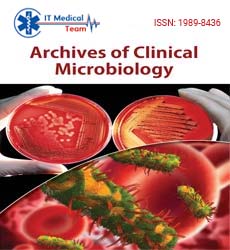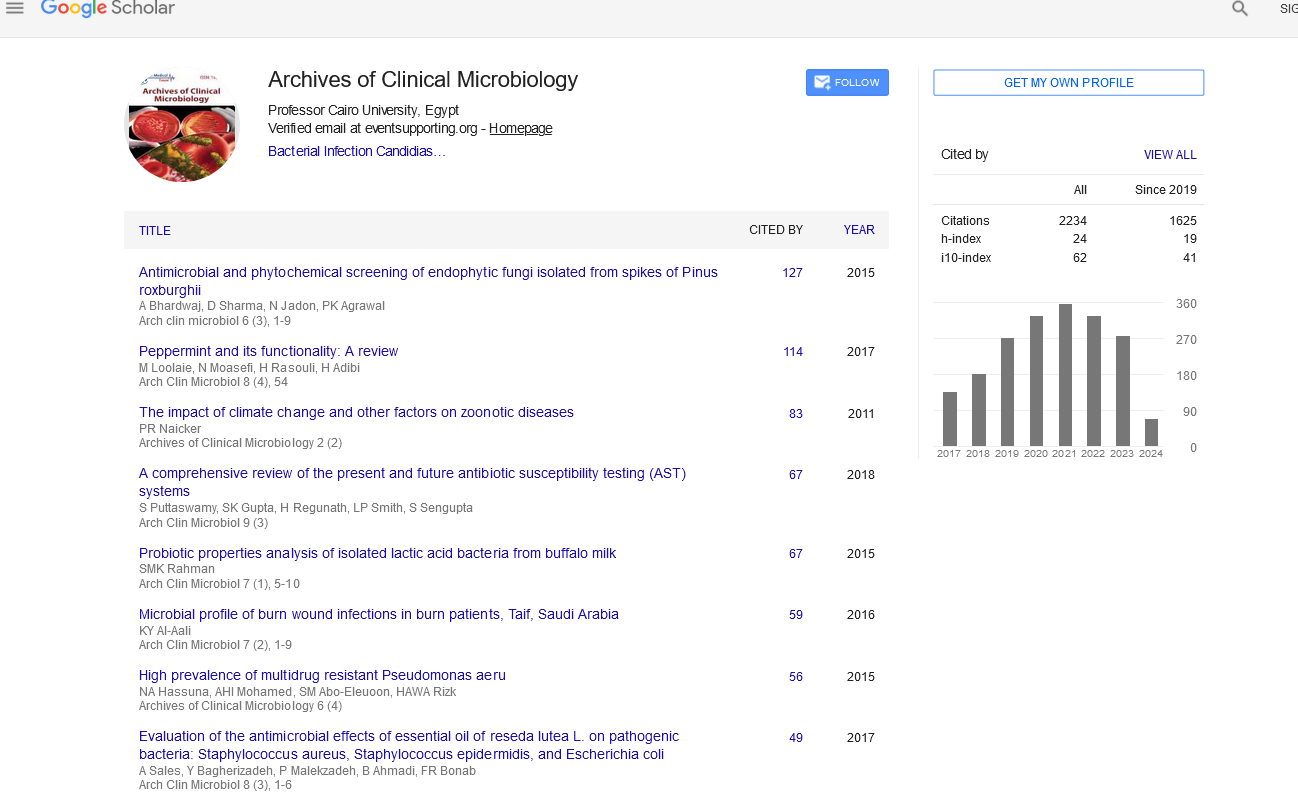Short Communication - (2024) Volume 15, Issue 6
Understanding Bacterial Infections: Causes, Symptoms, Treatment and Prevention
Rajeev Mohan*
Department of Biolochemistry, Jawaharlal Nehru University, New Delhi, India
*Correspondence:
Rajeev Mohan, Department of Biolochemistry, Jawaharlal Nehru University, New Delhi,
India,
Email:
Received: 22-Jul-2023, Manuscript No. IPACM-23-13964;
Editor assigned: 25-Jul-2023, Pre QC No. IPACM-23-13964 (PQ);
Reviewed: 08-Aug-2023, QC No. IPACM-23-13964;
Revised: 17-Dec-2024, Manuscript No. IPACM-23-13964 (R);
Published:
24-Dec-2024
Abstract
Bacterial infections are a significant global health concern, leading to a wide range of diseases and morbidity. Understanding the mechanisms by which bacteria invade, colonize, and cause damage to host tissues is crucial for the development of effective prevention strategies and therapeutics. This abstract provides an overview of bacterial infections, highlighting key aspects such as pathogenesis, host immune response and current approaches to diagnosis and treatment. It discusses the importance of antimicrobial resistance and the need for novel antimicrobial agents. Furthermore, emerging technologies and research areas, such as the use of bacteriophages and microbiota based therapies, are explored as potential alternatives for managing bacterial infections. This abstract emphasizes the need for continued research and collaboration to combat the growing threat of bacterial infections and ensure the health and well-being of populations worldwide.
Bacterial infections pose a significant threat to human health, causing a wide range of diseases and contributing to substantial morbidity and mortality worldwide. Understanding the nature of bacterial infections, including their causes, transmission mechanisms, and pathogenicity, is crucial for developing effective preventive and therapeutic strategies. This abstract provides an overview of bacterial infections, highlighting the importance of research in this field and the need for continued efforts to combat these infections. It emphasizes the complex interplay between bacteria and their human hosts, the challenges associated with antibiotic resistance and the potential for emerging bacterial pathogens to cause global outbreaks. The abstract concludes by emphasizing the significance of ongoing research and collaboration among scientists, clinicians, and policymakers in tackling the growing threat of bacterial infections.
Keywords
Bacterial infection; Pathogenesis; Host immune
response; Antimicrobial resistance; Diagnosis; Treatment;
Antimicrobial agents; Bacteriophages; Microbiota based
therapies
Introduction
Bacterial infections are a common occurrence worldwide and
can affect people of all ages. These infections are caused by
harmful bacteria entering the body and multiplying, leading to a
range of symptoms and health complications [1]. In this article,
we will explore the causes, symptoms, treatment options and
preventive measures for bacterial infections. Bacterial infections
have long been a significant public health concern, affecting
individuals of all ages and populations across the globe. These
infections encompass a broad spectrum of diseases, ranging
from mild self-limiting illnesses to life threatening conditions.
Understanding the intricacies of bacterial infections is essential
for effective disease management, prevention and control. In
recent years, there has been an increasing focus on elucidating
the molecular mechanisms underlying bacterial pathogenesis,
exploring novel treatment options and addressing the
emergence of antibiotic resistance.
Bacterial infections are caused by a diverse array of
microorganisms, including gram-positive and gram negative
bacteria. Factors such as virulence determinants, host immune
response and environmental conditions influence the severity
and outcome of these infections. The transmission of bacterial
pathogens can occur through various routes, including direct
contact, respiratory droplets, contaminated food and water and
vector borne transmission. The ability of bacteria to adapt,
survive, and spread within their hosts contributes to the
complexity and challenges associated with managing these
infections.
Description
To address these challenges, collaborative efforts among
scientists, clinicians, and policymakers are essential.
Advancements in genomics, proteomics and bioinformatics have
significantly contributed to our understanding of bacterial
infections and the development of novel diagnostic tools and
therapeutics. Additionally, promoting awareness, education, and
research on antimicrobial stewardship is vital in combating the
spread of antibiotic resistance [2]. Multidisciplinary approaches
and international collaborations are key to formulating
comprehensive strategies for the prevention, diagnosis, and
treatment of bacterial infections.
Causes of bacterial infections
Bacterial infections can be caused by various types of
bacteria, including Staphylococcus, Streptococcus, Escherichia
coli (E. coli), Salmonella and many others. These bacteria can
enter the body through different routes, such as inhalation,
ingestion, or direct contact with infected surfaces or individuals.
Common causes of bacterial infections include:
Poor hygiene: Insufficient hand washing, improper food
handling and inadequate sanitation practices can lead to the
transmission of bacteria.
Weakened immune system: A weakened immune system due
to factors like stress, chronic illness, or certain medications can
make individuals more susceptible to bacterial infections [3].
Contaminated food and water: Consuming contaminated
food or water contaminated with bacteria can lead to
gastrointestinal infections.
Wounds and injuries: Open wounds or injuries that are not
properly cleaned and treated can become a breeding ground for
bacteria, leading to localized or systemic infections.
Sexual contact: Some bacterial infections, such as gonorrhea
and chlamydia, can be transmitted through sexual contact.
Common bacterial infections and their symptoms
Bacterial infections can manifest in various parts of the body
and result in a wide range of symptoms. Here are some common
types of bacterial infections along with their associated
symptoms:
Urinary Tract Infections (UTIs): Symptoms may include
frequent urination, a burning sensation during urination, cloudy
or bloody urine and lower abdominal pain.
Respiratory tract infections: Bacterial infections like
pneumonia, bronchitis, or sinusitis can cause symptoms such as
coughing, chest pain, difficulty breathing, fever and fatigue.
Skin infections: Bacterial skin infections like cellulitis or
impetigo can lead to redness, swelling, pain and the formation
of pus-filled lesions.
Gastrointestinal infections: Symptoms may include diarrhea,
abdominal pain, nausea, vomiting and fever [4].
Sexually Transmitted Infections (STIs): Bacterial STIs such as
syphilis, gonorrhea, and chlamydia can cause symptoms ranging
from pain and discharge to ulcers and infertility.
Treatment of bacterial infections
The treatment of bacterial infections depends on the type of
infection, its severity, and the affected body part. Bacterial
infections are commonly treated with antibiotics, which are
medications designed to kill or inhibit the growth of bacteria.
The specific antibiotic prescribed will depend on the type of
bacteria causing the infection. It is essential to complete the full
course of antibiotics as prescribed by the healthcare
professional to ensure the complete eradication of the infection.
In some cases, hospitalization and intravenous antibiotics may
be required for severe infections.
Prevention of bacterial infections
Preventing bacterial infections is crucial for maintaining good
health. Here are some preventive measures individuals can take.
Practice good hygiene: Regularly wash your hands with soap
and water for at least 20 seconds, especially before eating or
preparing food, after using the restroom and after coughing or
sneezing.
Food safety: Handle and prepare food hygienically, ensuring
proper cooking temperatures and avoiding cross contamination.
Immunizations: Stay up to date with recommended vaccines
to prevent bacterial infections such as tetanus, diphtheria,
pertussis, pneumonia and meningitis.
Safe sexual practices: Use barrier methods like condoms to
reduce the risk of sexually transmitted bacterial infections.
Wound care: Clean and properly dress any wounds or cuts to
prevent bacterial entry.
Avoid close contact with infected individuals: Limit exposure
to people who are sick with contagious bacterial infections.
Proper sanitation: Maintain cleanliness in your surroundings
and regularly clean and disinfect frequently touched surfaces.
Conclusion
Bacterial infections are a significant health concern
worldwide, but understanding their causes, symptoms,
treatment options and prevention strategies can help minimize
their impact. Maintaining good personal hygiene, practicing safe
food handling and following preventive measures can
significantly reduce the risk of bacterial infections. In case of any
suspected bacterial infection, it is essential to seek medical
attention promptly for proper diagnosis and appropriate
treatment. Remember, prevention is always better than cure
when it comes to bacterial infections.
Bacterial infections remain a significant global health threat,
necessitating continuous research, innovation and collaboration.
By deepening our understanding of bacterial pathogenesis,
transmission dynamics and the challenges posed by antibiotic
resistance, we can strive to develop effective preventive
measures, diagnostic techniques and targeted therapeutics.
Through concerted efforts, it is possible to mitigate the impact
of bacterial infections, improve patient outcomes and safeguard
public health. Bacterial infections pose a significant threat to
human health and can result in a wide range of illnesses and
complications. They are caused by the invasion and growth of
harmful bacteria within the body, leading to various symptoms
and potentially severe outcomes if left untreated. The impact of
bacterial infections can be felt across all age groups and
populations, making them a global public health concern.
Fortunately, advances in medical science and the development
of antibiotics have greatly improved our ability to combat
bacterial infections. Antibiotics are effective in targeting and killing bacteria, helping to alleviate symptoms, prevent
complications and save lives. However, the emergence of
antibiotic resistance has become a growing challenge, limiting
treatment options and highlighting the need for responsible
antibiotic use and the development of alternative strategies.
While bacterial infections remain a significant health concern,
ongoing research, public health initiatives and individual efforts
are crucial in combating these infections. By adopting a
comprehensive approach that includes prevention, early
detection, appropriate treatment, and responsible antibiotic
use, we can effectively address the challenges posed by bacterial
infections and improve the health outcomes for individuals
worldwide.
References
- Gray F (1997) Bacterial infections. Brain Pathol 7:629-647
[Crossref] [Google Scholar] [PubMed]
- Kovacs A, Leaf HL, Simberkoff MS (1997) Bacterial infections. Med Clin North Am 81:319-343
[Crossref] [Google Scholar] [PubMed]
- van Elsland D, Neefjes J (2018) Bacterial infections and cancer. EMBO Rep 19:e46632
[Crossref] [Google Scholar] [PubMed]
- Fernebro J (2011) Fighting bacterial infections future treatment options. Drug Resist Updat 14:125-139
[Crossref] [Google Scholar] [PubMed]
Citation: Mohan R (2024) Understanding Bacterial Infections: Causes, Symptoms, Treatment and Prevention. Arch Clinic Microbiol Vol:15 No:6





